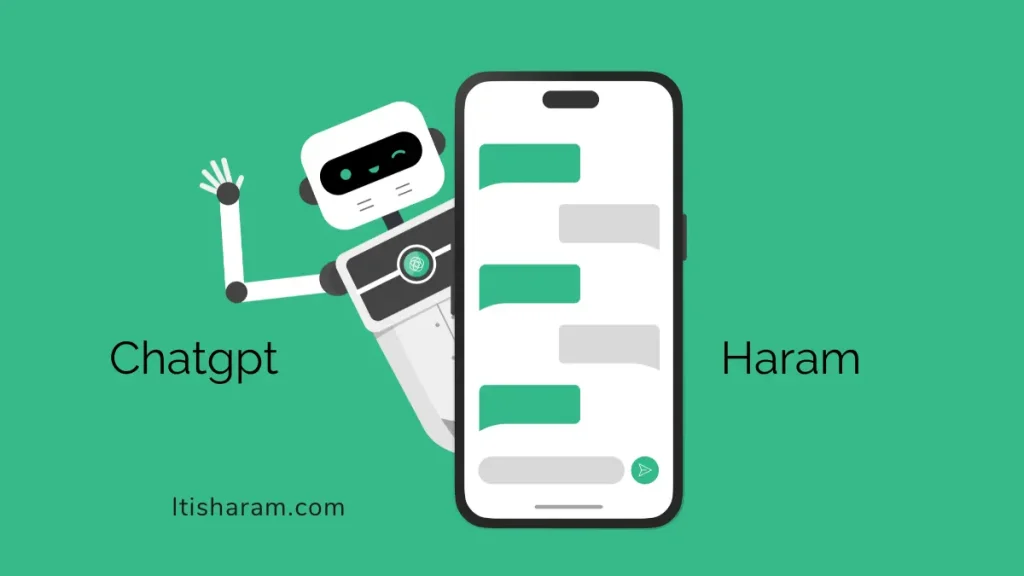In today’s rapidly evolving technological landscape, artificial intelligence has become integrated into many aspects of our lives. One of the main manifestations of AI is ChatGPT, a conversational AI developed by OpenAI. As with other technologies, questions have been raised about its ethical implications, particularly in religious contexts. Among these questions, one that comes up is whether ChatGPT is haram or not.
Is Chatgpt Haram?
No, chatgpt is not fundamentally Haram. It is a medium like any other apps or digital medium. You can use it to do both good and bad things. Like Photoshop or any video editing software. If you use it in a halal way then it is halal. And if it is used in any haram act then it is haram.
There are no simple answers within Islamic jurisprudence regarding AI technologies like ChatGPT. Because it is newly invented. The reason for this complexity is the AI itself. Because of its nature and the varied applications it serves.
So rather than inherently calling ChatGPT haram or halal, AI should be evaluated based on its specific application. Here are some key considerations for approving AI technologies like ChatGPT within an Islamic framework.

5 Ways to Know ChatGPT is Haram
- Motive: In Islam, the motive behind an act carries significant weight. If the purpose of using AI is to achieve beneficial results such as enhancing communication, providing educational resources or improving the accessibility of information, then it is halal. If the intention is harm, misinformation, or propagating immorality, then it will be haram.
- Ethical Conduct: Islamic teachings emphasize the importance of ethical conduct in all areas of life. Therefore, the ethical use of AI technology must be at the fore. These include that AI systems respect privacy, adhere to principles of fairness and justice, and avoid disseminating false or inappropriate content.
- Impact on Society: Islam lays great emphasis on the welfare of society as a whole. When assessing the halal of AI technologies, their potential impact on individuals and communities should be considered. If AI tools contribute positively to social development, alleviating human suffering, then they can be said to be halal.
- Avoiding Shirk: Shirk or associating partners with Allah. It is one of the gravest sins in Islam. Although AI itself does not possess consciousness or agency, there is a risk of inadvertently adding god-like qualities to AI systems. So if they are respected or relied upon improperly, it will be haram. Muslims should maintain a clear understanding of the limitations of AI. Attributing ultimate power and authority to Allah alone.
- Consultation with Scholars: Given the nuanced nature of Islamic jurisprudence, seeking guidance from knowledgeable scholars can provide clarity on specific issues related to the permissibility of AI. Scholars with expertise in both Islamic studies and technology can provide insights that help navigate ethical dilemmas and ensure compliance with Islamic principles.
Using ChatGPT is Haram in those 6 activities
Although ChatGPT is not fundamentally haram, there are certain activities that may conflict with Islamic principles. Here are seven activities, where using chatgpt is prohibited:
Spreading false information
If ChatGPT is used to spread false or misleading information, especially regarding religious significance or social importance, then it is Haraam. Islam emphasizes truthfulness and honesty. And deliberately spreading falsehood is strictly prohibited by Islam.
Promotion of immorality
If ChatGPT’s promotion creates immoral, obscene content or promotes conduct, it is prohibited. Gambling, substance abuse, or illicit relationships are also prohibited. Islam enjoins individuals to uphold moral values and avoid actions that lead to corruption.
Engaging in Unlawful Transactions
If ChatGPT’s API is used to facilitate transactions prohibited in Islam, such as sale or purchase of prohibited goods, its use will be haram. Islam prohibits engaging in activities involving riba or promoting unethical business practices.
Disrespecting Religious Teachings
If ChatGPT is programmed to ridicule or disrespect religious beliefs and practices, its use is prohibited. Islam encourages respectful dialogue. Thus forbidding actions that undermine the sanctity of religious teachings or sacred symbols.
Violation of Privacy
If ChatGPT is used to interfere with individuals’ privacy, such as disclosing private conversations or collecting sensitive personal data without consent, its use is prohibited. Islam emphasizes the importance of protecting the right to privacy and respecting the dignity of every person.
Engaging in Idolatry
ChatGPT may not be treated or treated in a manner that resembles idolatry or the worship of false gods. It is against monotheism or Tawhid and is haram. Islam strictly forbids associating partners with Allah. The Quran warns against attributing divine attributes to created beings or things.
It is essential to recognize that the permissibility of using ChatGPT or any technology in Islam depends on the specific actions and practices of its users. Therefore it is forbidden to use chatgpt for any dishonest activities apart from the above mentioned matters.
How to use ChatGPT in Halal way?
Using chatgpt in a halal manner means mindfulness, ethical consideration and adherence to Islamic teachings. Here are some guidelines on how to use chatgpt in a halal way:
- Seeking Knowledge and Education: Use ChatGPT to seek knowledge and educational resources relevant to Islamic teachings. Ask questions about religious beliefs, practices or moral principles to deepen your understanding of Islam. However, make sure that the information provided by ChatGPT comes from reliable sources and is consistent with established Islamic scholarship.
- Spread Positive Messages: Use ChatGPT to spread messages of kindness, compassion and encouragement aligned with Islamic values. Engage in conversations that promote mutual respect, tolerance, and understanding among people of diverse backgrounds. Avoid discussing or sharing content that may cause hatred, division or conflict.
- Facilitating productive discussions: Use ChatGPT to engage in constructive conversations on topics relevant to personal growth, social development and ethical behavior. Encourage discussions that foster critical thinking, empathy, and problem-solving skills.
- Providing Support and Guidance: Use ChatGPT to provide support and guidance to those who need it, such as counseling on personal challenges, moral dilemmas, or religious inquiries. Offer words of encouragement, sympathy, and comfort to those experiencing difficulty or seeking guidance in their faith.
- Maintaining a balanced approach: Use ChatGPT as a tool to complement, rather than replace, human interaction and decision-making. Recognize the value of face-to-face communication, empathy, and emotional intelligence in building meaningful relationships and solving complex problems. Balance the use of technology for productivity and human connection and spiritual well-being.
FAQs
What are some Haram activities related to chatgpt?
Activities that involve spreading false information, promoting immorality, engaging in illegal transactions, disrespecting religious teachings, violating privacy, indulging in idolatry, or replacing real human interaction may be considered haram.
Can ChatGPT be used for seeking religious knowledge?
Yes, ChatGPT can be used to seek religious knowledge in Islam. But it is imperative to verify the information provided by ChatGPT and ensure that it is consistent with authentic Islamic sources and teachings. Because ChatGPT collects information from impure and unacceptable sources and has the opportunity to disseminate it.
Is it Haram to use ChatGPT for educational purposes?
Using ChatGPT for educational purposes, such as learning new concepts or gaining insight, is generally permitted in Islam. However, individuals should be careful and prudent to avoid any material that is against Islamic values.
Are there any guidelines for using ChatGPT in a halal manner?
Yes, there are guidelines for using ChatGPT in a halal manner. These include promoting positive messages, facilitating productive discussions, respecting privacy and confidentiality, avoiding harmful activities, and maintaining a balanced approach to technology use.
Can ChatGPT be used to provide guidance?
ChatGPT can be used to provide support and guidance. However, individuals should be aware of its limitations and seek advice from knowledgeable counselors or religious scholars regarding matters of faith or personal dilemmas.
Is it Haram to rely heavily on ChatGPT for decision making?
Excessive reliance on ChatGPT or any AI technology for decision making is discouraged in Islam. Because it can diminish human responsibility and ignore the importance of personal judgment, counsel, and spiritual discernment.
How can I ensure that my use of ChatGPT is in accordance with Islamic principles?
To ensure that your use of ChatGPT is consistent with Islamic principles, try to maintain intentionality, ethical behavior and mindfulness in your interactions. When in doubt seek guidance from religious scholars and prioritize actions that promote truthfulness, compassion and piety.







